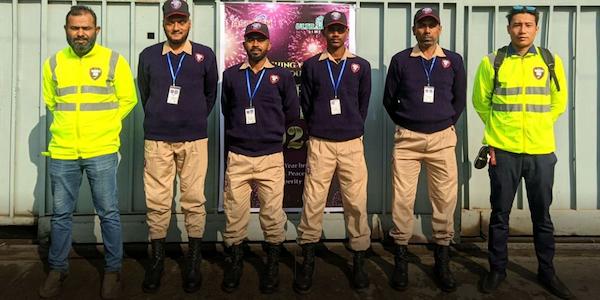Security standards and protocols keep people and property safe. Security guards must follow tight rules due to rising criminal and suspicious activity. Security guards need a code of behavior to work effectively.
Security guards must follow the 10 rules of security. Maintaining a visible presence, spotting dangers and suspicious activities, crowd control, and emergency response are among these rules.
Security guards succeed by following the 10 rules. It prevents crime and danger. A well-trained security guard ensures customer safety and corporate success. This comprehensive security approach protects property, people, and security agents and sets mechanisms for proper authorities to respond to incidents.
Rule 1: Professional Appearance and Demeanor
Security guards must act professionally. Company uniforms and dress code. Cleanliness inspires confidence. It also helps clients and security staff identify themselves in a crowd.
Be pleasant, calm, and hardworking. Security guards should be proud of their employers.
Professionalism determines a security team’s performance. Well-groomed, polite, and authoritative security personnel lead to trust. They guarantee workplace safety.
Rule 2: Alertness and Vigilance
Guards must be vigilant. Guards must watch for dangers before they become deadly.
Security demands constant patrols and observation. Guards must monitor crime-prone areas and respond quickly.
Reporting questionable activity protects everyone. Security guards must recognize unusual conduct and respond fast to prevent threats.
Finally, security officers must be alert. These requirements guarantee security personnel is prepared for dangerous situations.
Rule 3: Effective Communication
Security guards must communicate with employees, bosses, clients, and the public. Radio and active listening ensure accuracy. Security guards can communicate clearly and act quickly in dangerous situations. Furious folks need patience. Speak gently to avoid conflict.
Security personnel should carefully watch their surroundings. Expecting suspicious activities, threats, and crimes. Security employees must report instances swiftly and accurately to supervisors or authorities. Detailing accidents and hazards can prevent them.
Communication helps security guards protect everyone. It’s simple but lifesaving. Security guards help businesses and individuals avoid crime.
Rule 4: Adherence to Security Procedures
Security guards must follow protocols and regulate access. They must keep everyone safe. A well-trained security guard can see suspicious activities and threats to prevent crimes, armed robberies, and property damage.
Security guards can prevent problems by following safety regulations. Security must be apparent at political rallies, religious gatherings, and retail malls to deter crime.
Security team members must also be crowd control experts and ready to tackle dangerous scenarios. The security guard simply records incidents during their shift. To identify gas leaks, they must smell.
Security guards may protect clients and grow their businesses by following basic security standards.
Rule 5: Use of Security Equipment
Maintaining equipment helps security teams succeed. Security professionals must understand alarms, cameras, and access control. Maintenance and testing prevent emergency failure.
Alarms and cameras deter intruders. Security employees must comprehend these systems’ pros and cons.
Security professionals preserve property, deter crime, and keep people safe with preventive measures and equipment. Report security equipment issues in detail to prevent future issues and improve security team success.
Rule 6: Conflict Resolution and De-escalation Techniques
Security guards must learn conflict mediation and de-escalation. Preventing a quarrel from escalating begins with recognizing unsafe situations and knowing the hazards. Intervention requires good communication. De-escalation techniques including calming and comforting the parties, attentively listening, and maintaining a professional approach might help.
Security guards should also know their boundaries. Security guards must know when to call the police or emergency services.
Security guards at political rallies and religious gatherings must be trained to manage tough circumstances. They should be able to see suspicious behavior and threats before they happen. To prevent property damage and hazardous material mishandling, security staff should know safety practices.
Preventive conflict resolution works best. Successful security guards must be visible, enforce building restrictions, and provide detailed reports. Preventive measures reduce hazards and ensure safety in dangerous situations.
Rule 7: Documentation and Reporting
Security guards must document and report situations quickly. On-duty security personnel must document occurrences, observations, and exchanges. This paperwork can trace suspicious activity and threats. It’s needed for investigations and emergencies.
Security personnel must maintain report confidentiality and integrity. Securely keep and never share their info. Security experts must keep secrets to avert disaster.
They must also document and report. Taking detailed notes requires strong communication, attention to detail, and accountability. Also, need to record crimes to protect everyone.
Rule 8: Respect for Laws and Regulations
Security guards must know and follow laws and ethics. Following these laws protects everyone at work. Guards should know their authority and crime prevention methods. They must also realize that they must always obey safety and property rules. They should know to record any incidences in detail and involve authorities in any emergency. Security staff can better protect the public and preserve a good reputation by following the law.
Rule 9: Continuous Training and Professional Development
Rule 9 of being a great security guard is to always train and evolve. To be effective in security, one must keep up with current innovations and best practices. Regular training ensures security staff can manage any issues. Staying current helps security guards spot illicit behavior and risky circumstances.
Seeking personal and professional improvement is as important as following security trends. This may involve earning a degree or security certification. Attend conferences and networking events to learn from industry professionals. In preventive situations, good communication, observation, and smell are also important.
Well-trained security guards need ongoing training and personal and professional development. Learning and development help people handle difficult situations, protect others, and prevent property damage. Continuous progress keeps everyone safe.
Rule 10: Teamwork and Collaboration
Guards need cooperation. Security guards must collaborate. Several reasons matter. First, sharing information makes dangers easier to notice. Security professionals can collaborate and develop their teams.
Working together creates harmony. Teamwork improves morale and performance. This improves employee safety and corporate success.
Conclusion
Security guards must communicate, observe, and smell. They must notice dangers, prevent crimes, and respond appropriately in perilous situations. Keep detailed reports for future reactions.
For client and public safety, security firms must prevent crime. Security guards must protect businesses to succeed. Security guards must adapt to industry changes to excel.


